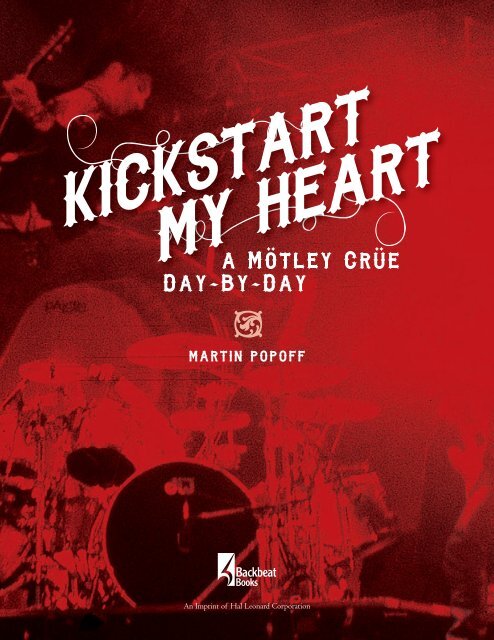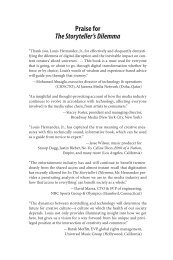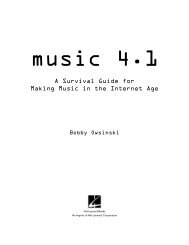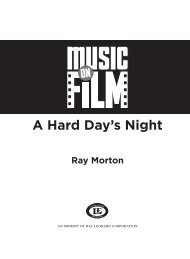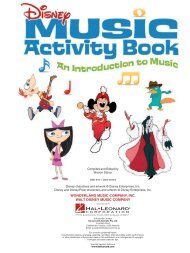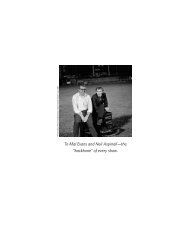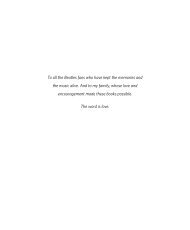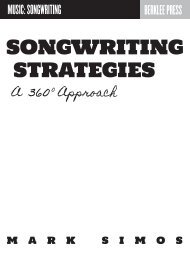Kickstart My Heart: A Motley Crue Day-by-Day
Create successful ePaper yourself
Turn your PDF publications into a flip-book with our unique Google optimized e-Paper software.
,<br />
,<br />
A MOTLEY CRUE<br />
DAY-BY-DAY<br />
[<br />
MARTIN POPOFF<br />
An Imprint of Hal Leonard Corporation
Contents<br />
vii<br />
1<br />
13<br />
85<br />
141<br />
205<br />
231<br />
237<br />
241<br />
243<br />
Introduction<br />
The ’70s and Times Past<br />
The ’80s<br />
The ’90s<br />
The ’00s<br />
The ’10s<br />
Selected Discography<br />
Sources<br />
Acknowledgments<br />
About the Author
Introduction<br />
W<br />
elcome back, folks, and pull up<br />
a chair as we enter the wide, wild<br />
world of Mötley Crüe, LA’s most notorious<br />
denizens, bad boys so you don’t<br />
have to, makers of a gritty, streetwise<br />
form of hair metal (wot?) that has sold<br />
tens of millions worldwide and caused<br />
much drinking and drugging on the side.<br />
But a few things first: as point of process, consider this “introduction” a<br />
quick hello from your intrepid author and a place to set the stage for the rock<br />
’n’ roll debauchery to come. Oh, indeed, we will learn much about Vince, Mick,<br />
Nikki, and Tommy as the pages flame on, but in terms of words direct from your<br />
ringmaster, well, I’ll be checking in for each of the decades with a treatise on the<br />
ten years of the Crüe about to unfold, and then letting the timeline tell the rest.<br />
And hence this is not the place to say too much about the Crüe, but suffice to<br />
say, the band has been part of my life for well on more than half of it. I can’t say<br />
it’s all been pretty either, ’cause as Nikki is wont to so honestly attest, the band’s<br />
third and fourth albums, Theatre of Pain and Girls, Girls, Girls, marked a degeneration<br />
of songwriting quality that this<br />
author has never gotten over.<br />
So, in a general sense, loved<br />
the band’s goofy, charmed debut,<br />
but was intimidated, confused,<br />
and disturbed <strong>by</strong> Shout at the Devil’s<br />
carnal idiocy (but it’s far and<br />
above my fave); and then kinda checked out<br />
for a while, disgusted <strong>by</strong> how the debauchery<br />
impeded the band’s ability to deliver what all<br />
of us fans not living in Hollyrock desired<br />
from the band: actual good records to power<br />
up our metal-mad Friday nights with might.<br />
I could spend two pages listing all the<br />
bands that were kicking ass all over Mötley<br />
once the belching black smoke of Shout at the<br />
Devil cleared, and like I say, there’s been a<br />
grudge ever since that decline. More on this<br />
in my decade-specific rambles, but to switch<br />
into happy glide again (and as a brief survey),<br />
it was inspiring to hear the band come<br />
back strong with Dr. Feelgood (grudge still in<br />
place, my brief on this has always been “real<br />
stupid people trying real hard”).<br />
Mick taking a few cues from Blackie<br />
Lawless and the W.A.S.P. man’s penchant<br />
for microphone decoration. © Greg Olma
viii † INTROD U C T I O N<br />
And then, lo and behold, with <strong>Motley</strong> <strong>Crue</strong> and Generation Swine, me an’ my pretty discerning<br />
music-fan friends suddenly found ourselves admiring of the band as creative talents,<br />
challenging us with extreme productions and arrangements, slowing it down, mixing it<br />
up, much thanks to Nikki and Tommy as pushers of envelopes.<br />
But then all the toxicity of the band’s bruising private lives . . . I dunno about you, but<br />
it wore on me hard. It was depressing. I found it tough looking at the whole inspirational<br />
rebel angle to it and found myself checking out again. Not that there was much substance<br />
to clutch: we’ve had two studio records since Generation Swine, although both are fun and<br />
full of value, especially when received into yer life as the calling cards of old . . . “friends?”<br />
But I’m getting away from myself. We’ll talk more as prelude to each of the four decades<br />
of the Crüe so far, plus a fifth preliminary chapter of pre-Mötley kiddie Crüe. Instead let’s<br />
finish up with some musings on method (of mayhem) as far as the structure of the book goes.<br />
What you hold in your hands now is the third volume that myself and the fine folks<br />
at Backbeat Books have put together using the “day-<strong>by</strong>-day” format, the first being 2 Minutes<br />
to Midnight: An Iron Maiden <strong>Day</strong>-<strong>by</strong>-<strong>Day</strong> and the second being Steal Away The Night: An Ozzy Osbourne<br />
<strong>Day</strong>-<strong>by</strong>-<strong>Day</strong>. The format is essentially composed of three components: 1) diary entries<br />
through time charting significant events; 2) quotes from the band and significant satellite<br />
speakers designed to elaborate, flesh out, or otherwise bring the story to life with a hint of<br />
“oral history” to the proceedings; and 3) lots and lots of tasty photos, not only of the dudes,<br />
but of records, promo items, backstage passes, ticket stubs, and my pet favorite, magazine advertisements,<br />
which potentially say so much about the way bands are marketed, in my opinion.<br />
The quotes and pretty pictures portion of the story . . . that part of it is explanatory, but<br />
there is a point I wanted to make about the diary entries I’ve carefully chosen to compile for this<br />
book. Putting aside the very real dimension that there is a specific word count I had to adhere to<br />
concerning our literary Crüe fest, indeed—and back to an earlier point—I found myself down<br />
into the dumps at just how much news related to this band is ugly and demoralizing.<br />
The Mad Max look revisited, 2014.<br />
© Kevin Estrada<br />
Nikki on an even keel in 2009.<br />
© Chris Casella
INTROD U C T I O N<br />
†<br />
ix<br />
Mick frying his mane at US<br />
Fest, 1983. © Rudy Childs<br />
Vince comes in for a<br />
landing. © Kevin Estrada<br />
Dammit, in the telling of the story, as the hours and days and weeks would grind on,<br />
reliving the lives of these four drama cases at a safe distance, at times I couldn’t place myself<br />
far enough away to avoid the contact high. And so a conscious decision had to be made<br />
to skip past the graveyards, keep passing those open windows, and stress in the entries as<br />
much positive as I could.<br />
Toward that end, I’ve kept to a minimum discussion and detail of the lawsuits, the punchups,<br />
the drugs, the drinking, the jail time, the fines, the divorces, the acrimony, the betrayals.<br />
To be sure, I’d be remiss if I didn’t mention, however briefly, the key events down those dark<br />
pathways, because if I didn’t, I’d get complaints that I haven’t told the story accurately at all,<br />
opting for something that was not only too sanitized but worse, too incomplete.<br />
And so, it’s interesting, but I think the more perceptive reader of our span of historical<br />
turmoil that is the Crüe will indeed begin to notice quite early on that this is a book about<br />
the music, and that if and when any of “the dirt” needs mention, the extent of detail is kept<br />
low and with minimal follow-up, as we hopefully move quickly to happier trails, namely<br />
continual re-engagement with what matters—the songs.<br />
Indeed, those who have been kind enough to partake of any of my other forty-seven<br />
books on heavy metal bands and subjects realize that what I like to discuss most is in fact<br />
every song, on a chronological album-<strong>by</strong>-album—even album-as-chapter—basis. First off,<br />
that’s not the format for these cool day-<strong>by</strong>-day books, but second, when yer talkin’ Mötley,<br />
I found myself constantly knocked off the rails into untold personal drama. Bottom line,<br />
it took extra effort over and above that of the Maiden or Ozzy books to keep it about the<br />
records, but this is what I tried to do. Hope that helps explain both the modus operandi<br />
and the tricky tone of what you are about to read. On with the show . . . .<br />
Martin Popoff<br />
martinpopoff.com
The<br />
’70s<br />
and<br />
Times<br />
Past<br />
N<br />
o question, it’s hard graft at times to<br />
find anything heartening and unsoiled<br />
about the sordid story of Mötley Crüe. And<br />
the band’s mostly awful experiences through<br />
childhoods and into the ’70s would seem to<br />
be no exception. It’s relentless, the poop.<br />
And yet there is one interesting and inspiring aspect to the formative years<br />
experienced <strong>by</strong> Vince Neil, Mick Mars, Nikki Sixx, and Tommy Lee, and that is<br />
the idea that all four of them came to the band with no musical accomplishments<br />
of note. Rather, collapsing into Mötley Crüe for each of these guys, as the ’70s<br />
became the ’80s, represented a degree of desperation for each of them.<br />
Let’s lift up the rock and peer under. First off, on the surface, it would seem<br />
that if we are to ascribe desperation to Vince’s or Tommy’s situation, it would be<br />
of a lesser sort than that of Mick and Nikki. Essentially, what we will find is that<br />
the pathway to Crüe for both of these guys—friends with each other and even<br />
roommates of a sort—is quite similar.<br />
Both Tommy and Vince took a pledge of poverty and homelessness <strong>by</strong> choice,<br />
gradually extricating and estranging themselves from family life and educational<br />
convention in pursuit of the rock ’n’ roll dream—food and accommodation be<br />
damned.<br />
Nikki, on the other hand . . . on the surface, it might have seemed he was in<br />
the same boat—knocking about Hollywood with goofy-looking glam bands, hiring<br />
and firing and getting kicked out, playing house parties and scoring women and<br />
drugs instead of pay—but rather, Nikki was pushed into the squalor of Hollywood<br />
as much <strong>by</strong> a horrible broken family life as he was <strong>by</strong> rock star aspiration. For<br />
Nikki, basically unemployable because of the unrealistic and anti-society thoughts<br />
in his head, it was construct a job for himself in rock or don’t eat.<br />
And then there’s Mick, dear old Mick. Older than the rest of the guys <strong>by</strong><br />
essentially ten years, Mick multiplied that age gap <strong>by</strong> living too much hardship,<br />
wearing much of himself out, throughout those ten years before the Crüe—years<br />
when Tommy and Vince were nothing more than happy-go-lucky teenagers on the<br />
make (Nikki, not so much). Girlfriends and wives come and gone, kids birthed<br />
with no money and no prospects, ridiculous disappointments band after band . .<br />
. Mick’s life was a book before Nikki stole his first guitar (thinking it was a bass).<br />
But then we get to the end of the ’70s, and Mick gets his last chance, throwing in his<br />
lot with three guys in roughly the same desperate rock place, and just as dead broke as Mick,<br />
but not yet suffocated <strong>by</strong> disappointment, still spunked and stupidly optimistic about how<br />
hard rock is for everybody and not just the most desperate.<br />
Oh sure, read on; the guys liked their rock and there had to be some ambition in<br />
there somewhere—that is, ambition beyond the blind ambition of somehow, improbably<br />
snorting and guzzling one’s way to the top. But the reverberation one gets from the 1970s<br />
experienced <strong>by</strong> these guys is one, again, of different forms and intensities of desperation.<br />
With nowhere to live, rock is survival, and in a quick second breath, rock is chicks and<br />
drugs. Rock might also be about acceptance and love. Rock is too fast for art.
2 † KICKST A RT MY HE A RT<br />
May 4, 1951 Robert Alan “Mick Mars” Deal—and thus Mötley Crüe—is born, in<br />
Huntington, Indiana.<br />
1956 Mick Mars witnesses flashy singing cowboy Skeeter Bond perform and his life as<br />
an entertainer unfurls before him. Christmas the following year gifts him a Mickey Mouse<br />
guitar and Bob soon learns “<strong>My</strong> Dog Has Fleas.”<br />
December 11, 1958 Frank Carlton Serafino Feranna Jr., aka Nikki Sixx, is born<br />
in San Jose, California, to a family soon to be broken.<br />
1960 Christmas this year reveals a Stella acoustic (pawn shop) guitar for Mick, courtesy<br />
of a cousin. Mick quickly learns “B Flat Blues.” Soon the family migrates to California,<br />
where Mick’s dad works in a cardboard box factory—Fender is a customer.<br />
February 8, 1961 Vince Neil Wharton is born in Hollywood, California, of<br />
Mexican descent on his mother’s side and Native American on his auto mechanic father’s.<br />
Mick, the wise elder of the band.<br />
© Kevin Estrada<br />
Vince still<br />
looking boyish<br />
in 2004. © Kevin<br />
Estrada<br />
Nikki channeling his inner Tom<br />
Hamilton. © Kevin Estrada
T H E ’70s AND T IME S PAST †<br />
3<br />
August 18, 1961 Jimmy Dean records a song he wrote with Roy Acuff called<br />
“Big Bad John,” with the song hitting #1 in Billboard <strong>by</strong> November. Nikki Sixx, as a child,<br />
comforted <strong>by</strong> the sounds coming out of his radio, is captivated <strong>by</strong> the song, notably the<br />
bad-boy mystique of it. As a young boy, he would repeatedly call the local station and<br />
request to hear it. Before Nikki’s fourth birthday, Nikki’s dad abandons him and Nikki’s<br />
free spirit of a mother.<br />
October 3, 1962 Tommy Lee Bass is born, in Athens, Greece. His father is a serviceman<br />
and his mother, a Miss Greece contestant in 1957. Meanwhile Mick fashions himself<br />
an amp out of a record player and starts learning surf guitar on his St. George Rodeo.<br />
1963 Tommy Lee’s family moves to Covina, California, where mom cleans houses and<br />
dad works as a superintendent at the LA County Road Department.<br />
December 25, 1966 Tommy gets a drum set for Christmas, with a cowbell and a<br />
flashing light in the bass drum. By this point, Mick has played in a Beatles cover band called<br />
the Jades plus Sounds of Soul, who perform around Orange County.<br />
NIKKI SIXX:<br />
<strong>My</strong> dad left when I was three. <strong>My</strong> Mom<br />
wasn’t available for me. I had a dysfunctional<br />
childhood. You mix that with<br />
hormones and teenage angst and you<br />
become a runaway. You’re running<br />
from something that hurts. It gets<br />
impacted and infected because when<br />
you look back, that doesn’t seem like a<br />
reason to not feel complete. But if you<br />
read any books on child and adolescent<br />
psychology, you find those first<br />
five to seven years are impactful for<br />
the rest of their life. If they don’t feel<br />
love and they don’t feel safe, if they<br />
feel things like abandonment, if they<br />
feel like a tumbleweed just blowing in<br />
the wind, it really affects their life. Then<br />
another thing happens, another thing<br />
and another, next thing you know,<br />
you’ve got this bucket and barrel and<br />
wagon and dump truck full of crap that<br />
you’re hauling around. And you don’t<br />
want to feel like that anymore. You’ve<br />
felt like that since you were a very<br />
young kid. (BW&BK, 2007)<br />
November 22, 1968 The Beatles (aka the White Album) includes one of<br />
the first heavy metal songs ever, “Helter Skelter,” which Mötley Crüe later covers on<br />
their Shout at the Devil album.<br />
1971 Mick Mars’ first wife Sharon births the couple a son, Les Paul.<br />
1971 Nikki “The Assassin” Sixx becomes an aggressive addition to the school football<br />
team; it is said his distinctive non-reflective black eye makeup is an homage to those<br />
days. Now living with his grandparents in Jerome, Idaho, in conjunction with football<br />
Nikki logs ten to twelve hours a day soaking up the songs coming out of the radio.<br />
April 23, 1971 The Rolling Stones issue Sticky Fingers, the album cover of<br />
which would be parodied for Mötley’s first record ten years later.<br />
The “Shout at the Devil” of a previous<br />
generation. Author’s Collection<br />
November 1, 1972 UK<br />
glamsters Slade issue their penultimate<br />
album, Slayed. “Mama Weer All Crazee<br />
Now” and “Gudbuy T’ Jane” get covered<br />
famously a decade-plus later within<br />
the US hair metal movement. Slade<br />
is a major influence on Nikki’s future<br />
band London, and the band’s gimmick<br />
of spelling words wrong rubs off on<br />
Mötley, who take Mick’s suggestion for<br />
a band name but bastardize its spelling.<br />
December 25, 1972 Tommy<br />
gets his first real drum, a snare drum,<br />
for Christmas. He works after school to<br />
build up a set around it and his father<br />
soundproofs the garage so that Tommy<br />
can practice. Tommy keeps up his rudiment<br />
chops through marching band.
The<br />
’90s<br />
T<br />
he hair metal that Mötley helped cause<br />
and yet so vehemently denied—whatever—was<br />
dying a death as grunge so deftly<br />
pointed out the facile materialism and petulant<br />
diva-mad tantrumness of a genre about<br />
to die for good come September 1991 and the<br />
release of Nirvana’s Nevermind. In essence, if<br />
musically what Soundgarden and Mudhoney<br />
were fed up with was Poison, Warrant, Slaughter,<br />
and a now unrecognizable Whitesnake, as<br />
people, the members of Mötley Crüe unfortunately<br />
were representing everything that<br />
was wrong with rock stars, from the wealthflaunting<br />
to the trail<br />
of broken homes.<br />
Mötley’s response? From an artistic<br />
standpoint (glad to be talking<br />
about the art), it was actually quite<br />
admirable. First off, they toured hard<br />
their celebrated 1989 album Dr. Feelgood,<br />
and then issued a greatest hits album.<br />
It contained a new song, “Primal<br />
Scream,” which has proven through<br />
history to be one of the dark-horse<br />
classics of the catalogue, and poignant<br />
as well, given that Nikki is writing there about<br />
his shattered childhood. Next we saw Nikki<br />
and Tommy blossoming as artists, as the two<br />
worked to push the band forward into the ’90s<br />
and remain vital through change.<br />
Vince, emblematic of the past, would be<br />
cast aside and right out of the band, while<br />
Mick would soldier on grumbling. Entering the<br />
fold would be a bold choice as replacement for<br />
Vince, relative unknown John Corabi. Inconsid-<br />
VHS for the ill-fated Moscow debacle.<br />
John Chronis Collection
86 † KICKSTART MY HEART<br />
erately wrecking things, spending stacks of cash, and learning nothing about the cause of<br />
the hating of their old music, the band nonetheless cranked out what is arguably their best<br />
album, <strong>Motley</strong> <strong>Crue</strong>—a grinding sprawl of gnarly modern metal smoked <strong>by</strong> wicked drums.<br />
It failed commercially—failed meaning, it only went gold—but that’s not the band’s<br />
fault. They had changed their singer, sure (and I bet half the audience thought Vince was the<br />
leader of the band), but tastes change and the ’90s were unforgiving for hard rock bands, especially<br />
bands so tied to the zeitgeist of the directly previous and hugely unfashionable decade.<br />
Management and market forces conspired to coax the band to take Vince back, but lo and<br />
behold, after three years of pain, the band turned in another creative triumph in the layered and<br />
forward-thinking Generation Swine. As armies of detractors wielded pitchforks and declaimed and<br />
defamed the band, many of us longtime Mötley watchers were saying “Well played, Nikki and<br />
Tommy, well played.” Fact is, every hair metal band was trying to make smart music, but Generation<br />
Swine proved that there were a couple of fearless artists in the band. Indeed, despite the tabloid<br />
lives they were leading (no doubt contributing to the band only getting two records out in<br />
the ’90s), Nikki was quietly proving himself a lover and maker of art, and Tommy was showing<br />
enthusiasm as a sound collagist, thinking well beyond the boundaries of the acoustic drum set.<br />
There’d be way more unsavory behavior to test the constitution of any Mötley fan before<br />
the decade was out, but back on the art (ah yes, the art): the band would close the decade the<br />
way they opened it, with a greatest hits album, this one actually called Greatest Hits. And in a<br />
second parallel, Nikki would strap some new music to the album, this time the band crafting<br />
two of its most joyous and hooky rockers of all time in “Bitter Pill” and “Enslaved.” Gone was<br />
the overt electro texturing of the Generation Swine era, but gorgeously new was an elevated sense of<br />
pop hookery, perhaps hinted and tinted <strong>by</strong> Nikki’s appreciation of Cheap Trick. It all bode well<br />
for the future of a band that unfortunately would spend the decade<br />
variably trying to stay current and just trying to stay . . . which Tommy<br />
didn’t, announcing his departure from Mötley Crüe in April of 1999.<br />
1990<br />
January 15, 1990 The day after a show in Houston, the band<br />
films a video for “Without You” at the Galveston Opera House, making<br />
use of a jaguar from a local wildlife refuge.<br />
February 22, 1990 “Dr. Feelgood” fails to pull in a<br />
Grammy, beaten to the punch <strong>by</strong> Living Colour’s smash hit “Cult<br />
of Personality.”<br />
February 28, 1990 America’s premier metal magazine,<br />
Circus, publishes the results of their 1989 Reader’s Poll. Mötley wins<br />
best band and Dr. Feelgood wins best album. Nikki wins best bassist<br />
and Tommy wins best drummer, while Vince takes fourth place for<br />
vocalist and Mick, fourth place as guitarist. The band also break the<br />
top five in the best single, best songwriter, best producer, and best<br />
long-form videocassette categories. Finally, the band rank as the #3<br />
disappointment of the year, but also #1 comeback of the year.<br />
With late-to-the-hair-farmparty<br />
Warrant supporting.<br />
Tom Wojcik Collection<br />
NIKKI SIXX ON THE REBUILT<br />
MOTLEY:<br />
It’s been so long since we’ve used anything that we don’t<br />
really think about it. Everybody else mentions it. The most<br />
important thing is the music and the show—our intensity.<br />
And when people go, “You guys aren’t partying anymore?”<br />
We go, “Oh yeah, we’re not.” It’s not part of our lives anymore.<br />
We just don’t dig the soapbox concept of sobriety.<br />
We do it because we want to. We did it because it was a<br />
challenge—we thought we could better the band, not for<br />
any other reason. If I didn’t have the band, I’d still be using<br />
everything. Everybody—everybody—has tried to be the<br />
devil and tempt us, you know, and we’re like, “But you don’t<br />
understand, you can’t tempt the devil.” I mean, we were the<br />
fucking most evil motherfuckers there were when it came<br />
to drug use and abuse. And people go, “Come on, dude, just<br />
smoke a joint with me!” And we’re going, “You don’t get it,<br />
man. If I smoke a joint with you, I’m gonna spend all your<br />
money doing blow all night, I’m gonna wreck your car and<br />
I’m gonna fuck your girlfriend. You don’t want me to smoke<br />
that joint with you, believe me!” (M.E.A.T., 1990)
THE ’90s †<br />
87<br />
And it’s back to<br />
Toronto’s Skybowl with,<br />
apparently, no need to<br />
name the support act.<br />
John Chronis Collection<br />
March 12, 1990 Mötley issue ballad “Without You” as a single, backed with “Slice<br />
of Your Pie”; working titles for the B-side included “Slice of the Night” and “Slice of Your<br />
Life.” “Without You” reaches #8 on the charts.<br />
March 21, 1990 Dr. Feelgood reaches triple platinum, and within another ten months,<br />
four times platinum. Four nights later in Augusta, Georgia, Tommy moons the crowd and<br />
is arrested onstage and charged with indecent exposure.<br />
Tom Wojcik Collection<br />
VINCE NEIL:<br />
We got serious and cleaned up. When we recorded Dr. Feelgood up in Vancouver, we began<br />
to get close again as we were all living in apartments together, and each one of us<br />
were in the studio all the time together, whereas previously, one of us wouldn’t be in the<br />
studio while the others were out—it wasn’t like a band thing anymore. Dr. Feelgood was a<br />
band thing—I’d be singing and I’d look out and see the other guys and they’d be cheering<br />
me on, so it was like doing the first album again. (M.E.A.T., 1991)
88 † KICKSTART MY HEART<br />
April 7, 1990 In New Haven, Connecticut, Tommy receives a concussion when<br />
his complicated rope system fails at approximately 10:45 and he tumbles backward, butting<br />
heads with a concert-goer. He spends the night at Yale-New Haven Hospital, with<br />
a spokesman estimating that Tommy might have fallen as far as sixty feet in the mishap.<br />
Tommy recalls waking up out of the fall and trying to get back into his kit, only to soon<br />
realize that he was in an ambulance.<br />
April 27–May 15, 1990 After four months of US dates, the Dr. Feelgood tour<br />
moves to Australia for five shows and Japan for six. Tommy’s wife Heather Locklear and his<br />
parents attend in Japan.<br />
May 20, 1990 On the way back to the US from Japan, Nikki marries Brandi Brandt<br />
in Hawaii.<br />
May 28, 1990 “Don’t Go Away Mad” is issued as a single, backed with “Rattlesnake<br />
Shake.” The track peaks at #19. The album’s previous two singles had gone Top Ten <strong>by</strong> this<br />
point, pushing Dr. Feelgood to sales of 4.5 million only nine months after release. The video<br />
for the song features Nikki and Tommy with the sides of their heads shaved.<br />
TOMMY LEE<br />
ON STAYING<br />
SOBER:<br />
It’s probably the toughest<br />
thing I’ve ever done. It’s like<br />
cancer. It’s a stupid disease.<br />
Every day I want a drink. I<br />
feel like a time bomb, like I’m<br />
going to snap at any moment.<br />
I guess I didn’t really love myself<br />
a lot. I didn’t have very<br />
much self-esteem. And I’d<br />
just drunk myself into a coma<br />
and do massive amounts of<br />
other stuff. Heather really<br />
helped me. (Circus, 1990)<br />
NIKKI SIXX ON THE VIDEO:<br />
I can’t believe the comments we’re getting. Fred Coury called me yesterday after seeing<br />
the video, and said we look like some psycho punk rockers. I said, “We do?” We don’t even<br />
think about it; we just do shit like that. We were bored— there’s no master plan in rock ’n’<br />
roll. Nobody says you have to look any particular way. Maybe next week the whole thing<br />
will come off. It’s not like we’re doing anything new with our hair. Metallica and other speed<br />
metal bands have been doing it for a while. We don’t really care as long as we<br />
have ourselves and the band. The music will pursue and be the most<br />
important thing. You see, we see ourselves as pretty normal, like a<br />
kid on the street. But I guess we’re pretty animated. (M.E.A.T., 1990)<br />
May 31–August 5, 1990 Playing Hawaii on the way back to<br />
the US, Mötley continue their blanketing of America, while also incorporating<br />
a cross-Canada leg. After all the accounting is in, each member of the<br />
band will have amassed $8 million in income.<br />
JOURNALIST STEVE MASCORD:<br />
Lee’s kit quivers and is lifted clear to the ceiling while he begins playing to sample tapes of<br />
the likes of AC/DC and Cream. The kit floats out into the audience and lowers frighteningly<br />
close to their collective heads. Lee, wearing a studded G-string and absolutely nothing else,<br />
puts one hand on a pole and leans out over the audience. He looks genuinely in awe of his<br />
situation, oblivious to the fact he does this every night. “Look how close I am to you fuckers,<br />
man!” he cries. He straps himself back in and keeps drumming. (Kerrang!, 1990)<br />
Mixing it up with a die-cut<br />
pass. Tom Wojcik Collection<br />
Kevin Estrada Collection
I<br />
n the ’90s, the crack in the armor<br />
that had been a solid Mötley lineup<br />
was represented <strong>by</strong> Vince taking a holiday<br />
(many holidays, and with strippers). The<br />
result was, shockingly, an album without<br />
him called <strong>Motley</strong> <strong>Crue</strong>, damn the umlauts<br />
along with Vince.<br />
The<br />
’00s<br />
Come the ’00s, and it’s Tommy who has left, but for more artistic reasons,<br />
namely his desire to explore hip-hop music, DJing, and essentially, <strong>by</strong> marrying<br />
Mötley with his new love, creating a form of rap metal.<br />
So Tommy is gone—cue the hoots of derision—for Methods of Mayhem,<br />
and Mötley is left to their own devices. Undaunted, they adopt journeyman Randy<br />
Castillo as drummer and turn in a record that is framed as a no-frills, back-to-theroots<br />
affair called New Tattoo.<br />
In a tough selling environment for traditional hard rock, the album doesn’t<br />
fare well, but alas, it’s a bunch of fun and triggers much lucrative touring, on and<br />
off. In fact, a shadow is cast over the very first tour of the decade, with Randy<br />
Castillo debilitated <strong>by</strong> the cancer that would kill him. Samantha Maloney is hired<br />
on as brave choice for Mötley drummer.<br />
As the decade wears on, Nikki will invent Sixx:A.M. on the wings of his confessional<br />
book, The Heroin Diaries; Vince and Tommy will discover a talent for reality<br />
TV; the band would have a surprise publishing-world hit with their raucous group<br />
Nikki 666, 2009.<br />
© Chris Casella<br />
Vince and Mick,<br />
July 22, 2009,<br />
First Midwest Bank<br />
Amphitheatre,<br />
Tinley Park,<br />
Illinois. © Greg Olma
142 † KICKSTART MY HEART<br />
autobiography The Dirt; and Tommy would return to the fold, although<br />
fully awakened to the fact that there is art for him past<br />
any of this often rote-<strong>by</strong>-numbers Mötley activity. There are more<br />
books, side projects, Crüe reissues . . . there’s a sense that the decade<br />
is a series of victory laps or at least the skilled fertilizing of a career.<br />
The momentous event, however, in Crüe history concerning the<br />
’00s would be the creation of a new album marking Tommy’s return to<br />
the fold. Saints of Los Angeles would become the band’s most mature, polished,<br />
and self-aware album, aided and abetted in that cause <strong>by</strong> Sixx:A.M.<br />
singer James Michael, who would write and produce with the band, in effect,<br />
putting his skilled stamp on the proceedings. Also on board is song<br />
doctor Marti Frederiksen who, like Michael, helps the record become<br />
somewhat unassailable but perhaps, in a sense, too perfect.<br />
As the decade comes to a close, Mötley Crüe is transitioning<br />
toward a classic rock act, a band of historical importance that can<br />
be celebrated through retrospective live shows even if the guys seem<br />
to be drifting towards other more personal projects to define their<br />
advancing years.<br />
2000<br />
January 11, 2000 “Get Naked,” the first single from<br />
Methods of Mayhem, is issued on 12” vinyl, in two formats, Filthy<br />
Version and Instrumental Version. The following day, the album is<br />
certified gold—it must be said, to some degree because of Tommy’s<br />
growing tabloid presence. Tommy keeps up the media assault—voluntary<br />
and sometimes not so voluntary—<strong>by</strong> presenting an award at<br />
the American Music Awards five days later.<br />
TOMMY ON THE STANDARD VERSION VERSUS THE FILTHY:<br />
It’s fucking edited like crazy. It’s cool, but I mean, there are big gaping holes in it. It’s a little<br />
rough to listen to, because I know what’s missing. But as a listener or fan, I hear it and go, “I<br />
want to go hear the real version.” It’s almost like you can’t fuck it up because it makes the<br />
listener want to go hear the real deal. It’s like a video with things blurred out; you don’t want<br />
to see that, you want to see the real thing.<br />
January 18, 2000 Coproduced <strong>by</strong> Mötley scholar Paul<br />
Miles, <strong>Kickstart</strong> <strong>My</strong> <strong>Heart</strong>: A Tribute to Mötley Crüe is issued. Cowriter<br />
of “Public Enemy #1,” Lizzie Grey, plays guitar and sings on the<br />
rendition of that track.
THE ’00s †<br />
143<br />
Very likely Mötley’s<br />
classiest stage set;<br />
2011 at the Hollywood<br />
Bowl. © Kevin Estrada


